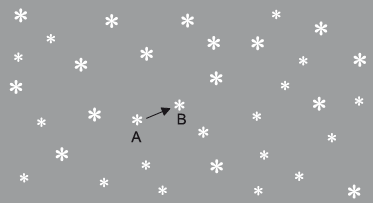| Date | November 2015 | Marks available | 2 | Reference code | 15N.3.HL.TZ0.1 |
| Level | Higher level | Paper | Paper 3 | Time zone | Time zone 0 |
| Command term | Outline | Question number | 1 | Adapted from | N/A |
Question
This question is about determining the distance to a nearby star.
Two photographs of the night sky are taken, one six months after the other. When the photographs are compared, one star appears to have shifted from position A to position B, relative to the other stars.

Discuss whether Hubble’s Law can be used to determine reliably the distance from Earth to this star.
Markscheme
this star is less than 1000 pc away/in our galaxy;
Hubble's law is for galaxies (not local stars) / red-shift will be too small to measure / uncertainty in Hubble constant high for such measurement;
Examiners report
Well discriminating question, better candidates realized that the star is closer to Earth and drew the diagram. Many candidates made a mistake to present diameter and the angle, giving half of the proper values. The relationships were generally well explained. In the alternative pair of quantities many candidates stated only the quantity for distance, not for the angle. The HL question related to Hubble’s law was properly answered only by better candidates. The SL question was poorly answered with most confusing stellar and spectroscopic parallax.

